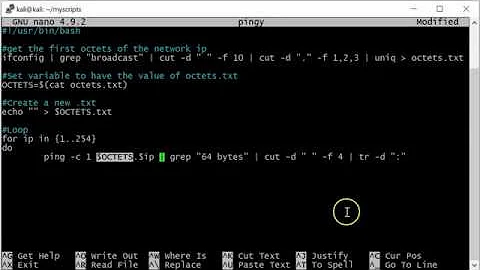Bash script to detect the version control system by testing command return status
Solution 1
If automatically checks the return code:
if (darcs show repo); then
echo "repo exists"
else
echo "repo does not exist"
fi
You could also run the command and use && (logical AND) or || (logical OR) afterwards to check if it succeeded or not:
darcs show repo && echo "repo exists"
darcs show repo || echo "repo does not exist"
Redirecting stdout and stderr can be done once with exec
exec 6>&1
exec 7>&2
exec >/dev/null 2>&1
if (darcs show repo); then
repo="darcs"
elif (test -d .git); then
repo="git"
fi
# The user won't see this
echo "You can't see my $repo"
exec 1>&6 6>&-
exec 2>&7 7>&-
# The user will see this
echo "You have $repo installed"
The first two exec are saving the stdin and stderr file descriptors, the third redirects both to /dev/null (or somewhere other if wished).
The last two exec restore the file descriptors again.
Everything in between gets redirected to nowhere.
Append other repo checks like Gilles suggested.
Solution 2
As others have already mentioned, if command tests whether command succeeds. In fact [ … ] is an ordinary command, which can be used outside of an if or while conditional although it's uncommon.
However, for this application, I would test the existence of the characteristic directories. This will be correct in more edge cases. Bash/ksh/zsh/dash version (untested):
vc=
if [ -d .svn ]; then
vc=svn
elif [ -d CVS ]; then
vc=cvs
else
d=$(pwd -P)
while [ -n "$d" ]; do
if [ -d "$d/.bzr" ]; then
vc=bzr
elif [ -d "$d/_darcs" ]; then
vc=darcs
elif [ -d "$d/.git" ]; then
vc=git
elif [ -d "$d/.hg" ]; then
vc=hg
fi
if [ -n "$vc" ]; then break; fi
d=${d%/*}
done
fi
if [ -z "$vc" ]; then
echo 1>&2 "This directory does not seem to be under version control."
exit 2
fi
Solution 3
Well, it's not very pretty, but it's one way to do it inline:
if darcs show repo > /dev/null 2>&1; then <do something>; fi
By definition, if tests the exit code of a command, so you don't need to do an explicit comparison, unless you want more than success or failure. There's probably a more elegant way to do this.
Related videos on Youtube
Niall Murphy
Postdoc. Interested in TCS, natural computing, synthetic biology.
Updated on September 17, 2022Comments
-
Niall Murphy almost 2 years
I am working on a bash script that I would like to work for several types of VCS. I am thinking of testing if a directory is a repo for a system by running a typical info command and checking the return code, success or error. In pseudo code:
if a svn command succeded; Then run svn commands elif a darcs command succeded; Then run darcs commands elif a mercurial command succeded; then run hg commands else something else fiI can run a command, e.g.
darcs show repoand use$?to get its return code.My question is: is there a neat way to run and return the return code number in one line? for example
if [ 0 -eq `darcs show repo`$? ];Or do I have to define a function?
An added requirement is that both stderr and stdout should be printed.
-
Niall Murphy over 13 yearsNice and clean, however these methods print out messages to the user. I would prefer the script to be silent (I have added this to the question).
-
clerksx over 12 yearsWhy are you running these in a subshell? It's unnecessary.




